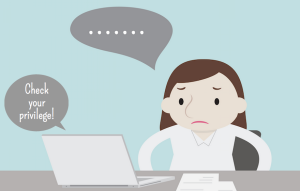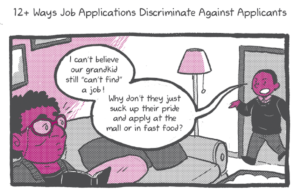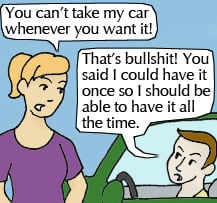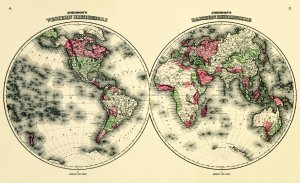
Source: Liberating Working Moms
Dating is something a lot of people want to do, but it’s also something that nobody seems to know how to go about doing.
Human emotions can be fickle, and motivations can be unclear. Understandably, we want unconditional love, and we fear rejection and vulnerability. And as such, people do their best to give romance rules and regulations. If it has some sort of formula, we hope, maybe the relationship will have a better shot.
From magazines to talk shows, the media tries repeatedly to decode the language of love. Doling out romantic advice has become the cornerstone of advice columns and fluff pieces.
There’s apparently an endless list of do’s and don’ts when it comes to relationships. If you follow the formula, you will supposedly have a successful romance.
However, the majority of these (heteronormative) tips are, in actuality, subtly sexist ways of undercutting female agency and diminishing a woman’s influence on her own romantic life.
Of course, plenty of dating isn’t heteronormative. Although the focus of this article will be heavily centered in heteronormative dynamics, it’s a reflection of the problematic social dynamics that we’re oversaturated with.
We’re talking heteronormatively because so much of our dating culture is unfortunately heteronormative.
Although these “rules” claim to guide you towards happiness and finding a partner, they’re actually quite oppressive – or just plain silly – once you read between the lines.
So let’s break down some examples of dating advice that might be better left unsaid.
1. He Has to Make the First Move
There’s a myth that men have to always be the ones who set things in motion in relationships. Many women like “strong” men, which also ties into being authoritative and taking charge.
The attitude that real men call the shots is best exemplified by celebrity matchmaker Patti Stanger, who runs her entire business based on a strictly gendered dating process.
Men have to plan the dates, men have to initiate kissing, men have to be the ones in charge of courtship, and so on. Conversely, women she deems too aggressive are stereotyped as masculine and assigned tasks to “soften their energy.”
While such militant ideology might seem extreme, it’s reflective of preconceived notions we have about how relationships can form. People believe that men are the ultimate romantic authority and that this right stems from masculine power over femininity.
Sure, an increasing number of women wouldn’t bat an eye at asking a guy out, but more significant relationship steps, like proposing, are still seen as a traditionally male duty.
Think about how ridiculous this is, especially for early phases of dating. If I like you, I’m pursuing you. I’m not going to wait around hoping you decide you want to date me. Besides, a woman should not approach a date as a job interview for male approval.
Even men themselves are inviting women to make the first move!
A woman’s opinions and perspectives are equally as important as a man’s. A partnership is two people. Stop insisting that the man holds all the cards. Ladies, go out there and get what you want.
2. Don’t Show Your Flaws Too Early
This one tries to be all cute and humorous, but it’s just shitty on so many levels.
It dusts off the age-old belief that women are all unkempt or unstable (and therefore undesirable) to some degree behind the mask.
Ever heard the phrase “makeup is false advertising?” Similar logic is at play here. Women are assumed to be constantly scheming, duplicitous, and untrustworthy. By “showing your flaws” prematurely, you’ll break the facade of perfection you have to maintain in order to reel him in.
Women are paradoxically shamed for being inauthentic and shamed for wanting to be authentic. You’ll sabotage your relationship, they claim, because no man could feel genuine initial attraction if you lay all your flaws on the table.
I say show all your true colors from the jump. Think of it as asshole insurance. If he rejects you, he wasn’t good boyfriend material anyway.
You shouldn’t feel pressure to constantly put on a performance or hide parts of yourself just to get someone to like you.
Honestly, anyone who requires that much effort probably isn’t worth it, and people who believe otherwise probably aren’t worth it either.
3. You Met How? That’s Not a Real Relationship – It Won’t Last!
Everyone loves dumping on relationships that are perceived as having illegitimate beginnings.
For example, online dating is becoming more common, but developing a relationship with someone you met online in any other context is still heavily stigmatized. People in long distance relationships online are characterized as desperate or setting themselves up for danger. We look down on them or pity them for not being able to date within the traditional setting.
Meanwhile, people who have met in bars or nightclubs or on the sidewalk date each other all the time.
My point is that however you meet is arbitrary – and just because you meet in a traditional way, it doesn’t mean your relationship will necessarily succeed.
The origin of the relationship has no bearing on the overall health of the relationship or compatibility between partners.
4. A Man/Woman Likes a Woman/Man Who _________
Just stop. I included multiple genders to acknowledge different scenarios, but let’s face it, this is almost always used in the context of policing women for not conforming to patriarchal standards.
Talk show host Steve Harvey frequently invites women who are having dating problems onto his show so that he can diagnose their issues. It usually boils down to Steve pointing out their bad habits and giving them a lecture on what guys like. Because Steve Harvey is the ultimate source for the opinions of all men, apparently.
A man likes a woman who cooks. A man likes a woman who keeps the house clean. A man likes a woman who lets her man take charge. Blah blah blah. Stop shaming women for daring to have individuality beyond a man’s preferences.
Women shouldn’t care what you like if you’re belittling them for who they are.
That goes for everyone as well, regardless of gender. Are you really going to rule someone out as a partner or say they don’t deserve a partner because they don’t form to asinine gender expectations?
5. Just Keep Pursuing Them – You’ll Wear Them Down Eventually!
Romantic comedies might teach us that continuing to pursue someone after they’ve rejected you is romantic and endearing, but in reality, it has frightening parallels to rape culture.
Someone is being told to completely ignore the other person’s comfort and safety for the sake of their own desires. They shouldn’t stop until they get what they want. The other person will have to just accept it.
It shouldn’t be surprising that this encouragement is most common in cases where a man is pursuing a reluctant woman. Again, male whims always supersede female in importance. Her rejection doesn’t matter if he wants her badly enough.
Talk about toxic! Even if he does convince her to date him, it speaks volumes that he doesn’t care what he put her through or whether or not the level of attraction is mutual.
People need to learn that other people are not obligated to fulfill their fantasies. You shouldn’t want to date the idea of a person, you should want to date the actual person. The relationship will be so much better and healthier if feelings and communication are reciprocal.
6. You Can’t Expect Someone to Love You Until You Love Yourself
I saved this one for last because it’s startling to me how often it’s passed off as empowerment.
It falsely positions love as a reward for passing a certain threshold of self-improvement and introspection. This isn’t Eat, Pray, Love we’re talking about here.
It places the burden on the person with low self-esteem that they need to work out their issues or that whatever problems they’re experiencing make them unfit for any potential partners. It sends the message that you’re setting yourself up for failure unless you enter a partnership having a flawless self-image.
Self-confidence is not a prerequisite for deserving someone else’s love. Self-love is hard! Unlearning toxic messages about beauty and self-worth can take years. It’s a complex process. Just because you might not love yourself yet doesn’t mean you’re unworthy of a relationship.
Now, it’s highly possible that low self-esteem could create problems in a relationship, but it’s not a direct correlation. People with perfect confidence aren’t any more likely to have a smooth relationship. The health of your dynamic depends on a myriad of other factors.
Also take note of the fact that this sentiment is likely aimed at women, insinuating that it’s their fault for not loving themselves and therefore being alone. Society creates low self-esteem in women and then blames them for focusing on their insecurities.
Everyone needs to block the impulse to blame lack of self-love (which can also be exacerbated by depression and anxiety, as well as other mental health issues) for absence or failure of romance.
Most people don’t know the exact circumstances behind someone’s low self-esteem, so it really shouldn’t be treated as a switch that just needs to be flipped to gain access to a happy ending.
***
The one true dating secret is that there isn’t one.
Every person is different, and every relationship is different. Trying to shoehorn potential partnerships to fit a set of arbitrary rules just confuses people before they even start dating.
Dating is supposed to be fun. By all means, get advice and outside opinions if and when you want them, but also know when to tune out background noise.
Enjoy getting to know people. Don’t worry about bullshit advice.
[do_widget id=”text-101″]
Erin Tatum is a Contributing Writer at Everyday Feminism. She’s a feminist, queer theory lover, and television enthusiast living in Pennsylvania. She is particularly interested in examining the representation of marginalized identities in media. In addition to Everyday Feminism, she’s also a weekly contributor to B*tch Flicks. Follow her on Twitter @ErinTatum91.
Search our 3000+ articles!
Read our articles about:
Our online racial justice training
Used by hundreds of universities, non-profits, and businesses.
Click to learn more




















